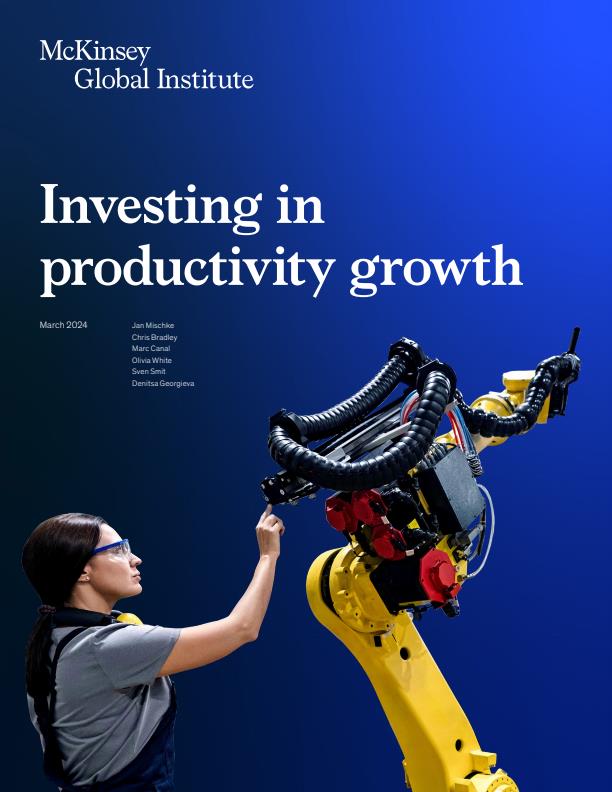- 经济管理
- 行业报告
- 企业管理与咨询报告
麦肯锡: 促进生产力增长的投资研究报告 ( 英文 58页)
It’s time to raise investment and catch the next productivity wave.
是时候增加投资并赶上下一波生产力浪潮了。
At a glance
提要
The past quarter century has been a success story for global productivity. Median economy productivity has jumped sixfold. Thirty emerging economies, with 3.6 billion people, are in the “fast lane” of improvement; if they maintained this pace, they would converge to advanced-economy productivity levels within roughly the next quarter century.
过去四分之一个世纪是全球生产力的成功故事。经济生产率中位数跃升了六倍。 30个新兴经济体、36亿人口正驶入发展“快车道”;如果他们保持这一速度,他们将在大约接下来的四分之一个世纪内趋向发达经济体的生产率水平。Yet amid this global revolution, many economies have experienced productivity stagnation. Advanced-economy productivity growth has slowed by about one percentage point since the global financial crisis (GFC). At their current pace of improvement, “slow-lane” emerging economies, home to 1.4 billion people, would never catch up to advanced-economy levels.
然而,在这场全球革命中,许多经济体都经历了生产力停滞。自全球金融危机 (GFC) 以来,发达经济体的生产率增长已放缓约 1 个百分点。按照目前的发展速度,拥有 14 亿人口的“慢车道”新兴经济体永远无法赶上发达经济体的水平。Today the world needs productivity growth more than ever. It is the only way to raise living standards amid aging, the energy transition, supply chain reconfiguration, and inflated global balance sheets.
今天,世界比以往任何时候都更需要生产力增长。这是在老龄化、能源转型、供应链重组和全球资产负债表膨胀的背景下提高生活水平的唯一途径。By investing to regain pre-GFC productivity growth, advanced economies stand to gain between $1,500 and $8,000 in incremental GDP per capita by 2030. These economies experienced their slowdowns as two waves of productivity growth in manufacturing (powered by Moore’s law and offshoring) came to an end. Post-GFC investment declined sharply and persistently, failing to generate anything to take their place. But today, directed investment in areas such as digitization, automation, and artificial intelligence could fuel new waves of productivity growth.
通过投资恢复全球金融危机前的生产率增长,到 2030 年,发达经济体的人均 GDP 增量将达到 1,500 至 8,000 美元。随着制造业生产率增长的两波浪潮(由摩尔定律和离岸外包推动)到来,这些经济体经历了经济放缓。结束。全球金融危机后的投资持续急剧下降,未能产生任何东西来取代它们。但如今,对数字化、自动化和人工智能等领域的定向投资可能会推动新一波的生产力增长。Investment is also the primary driver for emerging economies to reach or remain in the “fast lane.” Current fast-lane economies (China, India, parts of Central and Eastern Europe, and Emerging Asia) have sustained high investment, at 20 to 40 percent of GDP. They have channeled it into building the cities and infrastructure that underpin successful urbanization, higher productivity in service sectors, and globally connected manufacturing. Economies in the middle and slow lanes might follow suit.
投资也是新兴经济体进入或保持在“快车道”的主要驱动力。当前的快车道经济体(中国、印度、中欧和东欧部分地区以及新兴亚洲)持续保持高投资,占 GDP 的 20% 至 40%。他们将其用于建设城市和基础设施,以支撑成功的城市化、服务业更高的生产力以及全球互联的制造业。中道和慢道经济体可能会效仿。There is reason for hope and motivation for action. Higher inflation and interest rates may signal stronger demand and encourage productive capital allocation—while discouraging the increasing debt and inflating asset prices of the past two decades. AI has potential to change work rapidly and broadly, creating fertile conditions for such investment.
我们有理由抱有希望,也有行动的动力。更高的通胀和利率可能预示着需求更强劲,并鼓励生产性资本配置,同时抑制过去二十年不断增加的债务和不断上涨的资产价格。人工智能有潜力快速、广泛地改变工作,为此类投资创造肥沃的条件。
Contents
目录
At a glance 1
一瞥
The world needs to—and can—accelerate productivity growth 2
世界需要,并且可以加速生产力增长
The rise and fall of global productivity growth in the 21st century 5
21世纪全球生产力增长的兴衰
Advanced economies: The breaking waves of productivity 17
发达经济体:生产力的冲浪浪潮
Emerging economies: The fast lane to prosperity 31
新兴经济体:通往繁荣的快车道
An agenda for productivity growth in a changing geo-economic era 45
在地缘经济时代变化中的生产力增长议程
Acknowledgments 52
致谢
[报告关键词]: 生产力×下载《麦肯锡: 促进生产力增长的投资研究报告 ( 英文 58页)》需 50点,包月包季包年会员(点此注册)免费下载。
一、非注册用户快速自助下载两步完成:1 注册(点此),2 购点卡(点此) 充值(点此)自主下载
二、非注册用户直接付款(点此付款),付款后短信(18121118831或加微信)告知题目或者Email,我们通过邮件发给您。需要帮助?专题跟踪研究报告
企业出海 新质生产力 低空经济 生成式AI 工业互联网 数字藏品 动力电池 ESG 数字化转型 机械零部件 氢能 碳中和 区块链 元宇宙 建筑 矿产 安永 数字货币 新基建 日化 案例分析 毕马威 贝恩咨询 普华永道 波士顿 罗兰贝格 德勤咨询 埃森哲 麦肯锡 电商 金融科技 人工智能 物联网 互联网金融 大数据 3D打印 食品饮料 家电行业 零售连锁 新能源 商业地产 快递行业 机械设备 汽车 核电 电子产业 电力行业 新兴产业 纺织服装 医药生物 广告传媒 金融投资 航空 旅游 酒业 能源 有色金属 通信 石油化工 物流供应链 房地产 可行性报告 PPP 商业计划书 五力分析 并购重组 发展战略 SWOT 产业链 钻石模型 价值链 PEST 人力资源 面板模型 stata 精华推荐 供应链金融 互联网+ 机器人 O2O 教育培训 论文资料查找 写作修改服务 EMBA论文写作 硕士论文 本科论文 论文写作每年为数千个企事业和个人提供专业化服务;量身定制你需要的研究报告的资料和报告
相信我们!企业客户遍及全球,提供政府部门、生产制造企业、物流企业、快消品行业专业化咨询服务;个人客户可以提供各类经济管理资料、商业计划、PPT、MBA/EMBA论文指导等。
点此填写您的需求15+年的经验,值得信赖
可以QQ联系我们:896161733;也可以电话:18121118831

